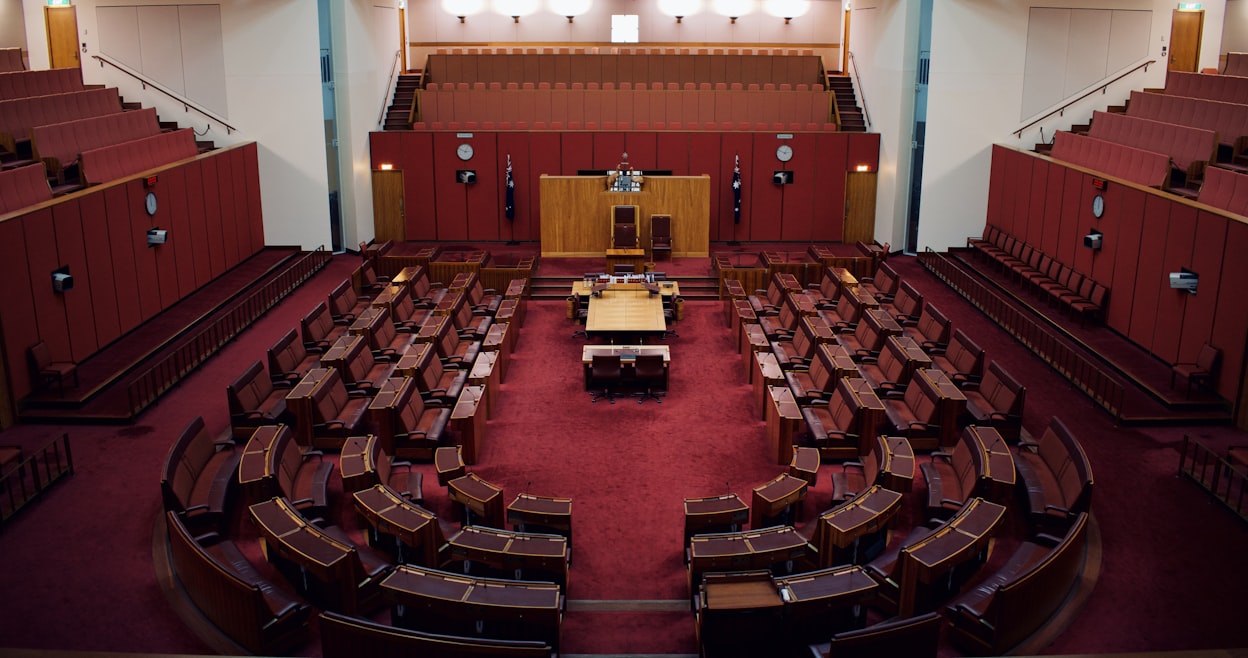
[Unsplash](https://unsplash.com/photos/7FW5-3vVRSw)
For most of my voting life, I've been an in-principle proponent of the Australian electoral and governance system at the national Federation level. There are a couple of unique features of the system that I thought were vast improvements upon the democratic systems that other Western nations had, which emphasised our history of Commonwealth and a egalitarian outlook on wealth and distribution.
As a relative newcomer to the company of nationhood, we were able to implement things early on that now seem pretty obvious... like women's suffrage (universal suffrage had to wait a bit... that was a dark trade off....) and secret ballots to name a couple of democratic "innovations".

#
Two Features

[Unsplash](https://unsplash.com/photos/IBWJsMObnnU)
The features that I really thought were uniquely good for the Australian democratic system were: Compulsory Voting and Preferential Voting. These are two distinct features were two concepts that tied harmoniously into other features to preserve our democratic system, like the Senate (State representation) and an independent Electoral Commission for determining boundaries and other election based problems.
###
Compulsory Voting
Unlike other countries, we view the act of voting to be a citizen's duty... now, I have heard before that it should not be in the purview of a government to compel you to vote. However, the technical part of this idea is that you are only compelled to show up once every election cycle and collect the ballot papers. After that, you can do whatever you want with them... eat them, draw pictures, build a paper boat or even cast a vote!
It is part of the social contract that binds us as a nation. We all take part in the process of choosing a government, and so there can be no sense of non-ownership of the result due to the lack of participation. Another benefit is that parties need to pitch to the centre of the electorate rather than going to the Left/Right to bring out a loyalist vote.
###
Preferential Voting
I have had friends describe this concept as an amazing and wonderful development on the system of casting a vote. Most countries have a version of first past the post, whereby the winner of a seat or district is just the guy with the most votes after all the votes are counted.... this is where the voter can choose only a single candidate for their vote.
Preferential voting requires the voter to number all (or a minimum quota, or to follow a preset party preference announced before the election) available candidates from first to last. In the first round, all the first choices are tallied and the candidates ranked in order. The LAST candidate is removed, and all of their supporting votes move to the second preference.... repeat and rinse until you have a clear winner (more than 50% of the available votes).
This system allows you to vote for minor or single interest parties without "wasting" your vote, as your preferences will still be followed if your preferred candidate gets eliminated from the race.

#
My Current Problems....

[Unsplash](https://unsplash.com/photos/3y1zF4hIPCg)
Since I got old... I started thinking more about these systems. Like any system, given the will, they can be gamed and their usefulness starts to grow stale. In theory, these systems are good and interesting ideas with worthwhile intents... however, in practice, we essentially get a two-party system in the Lower House, and in the Upper House we usually have a balance of power party (independents, or non-centre Left and Right) holdings sway.
Now, the Upper House was designed to be a balance against the excesses of the governing party in the Lower House... it was designed with equal representation among the States (and Territories) that make up our Commonwealth. So, Senators should be viewing governance and law-making with respect to the impact on their state constituency. In recent history, we have seen that it has turned into a party line affair...
###
Compulsory Voting
One assumption with Compulsory Voting is the idea that the population in general is informed and active about governance and the effects of law making and policies. Let us just say that that might have been a touch idealistic.... Most people don't follow the news in a broad way (listening only to a narrow cast of familiar ideas...)... and with little depth (slogans and easy to market narratives are much more memorable than a 500 page academic analysis). Or more depressingly, it becomes a matter of how much is received in "bribes" (sorry, tax relief or redistribution... depending on what affects your particular situation)... it is a weighing up of financial incentives rather than ideas that have little immediate monetary values (sigh, that is another post there...).
Another problem is the emergence of politics as a "team" sport.... by this, I mean that people will vote constantly for their "team"... as if it was a football match rather than a contest of ideas and policy platforms. Brand and team loyalty are paramount... I say this as a voter who leans progressive on certain issues and conservative on others... I wish I could have different votes for different agendas (that is a topic for a different post!).
###
Preferential Voting
In theory, this should have allowed us to vote for any candidate in our own preferred preference rather than trying to play the game of voting for the imperfect candidate so as to now "waste" your vote. However, in practice... most of the votes flow back to the two centre parties.
It could be worse I guess... but it does give the centre parties a sense of entitlement... the idea that they are either the current rulers... or the rulers in waiting.

#
Maybe it is the Senate?
In the end, I still think that the ideas of Compulsory and Preferential voting are much better than the alternatives which we see in other Western democratic nations. Perhaps the problem does lie in a different place... given that there are weaknesses in the concepts of Compulsory and Preferential voting as trade offs for their quite substantial advantages. Perhaps the solution to their weaknesses lies in a different part of the governance structure.
The Senate has started to reflect too much the Lower House... this is not a great thing, as to serve as a check and balance, it needs to have a different composition. Normally, the government of the day will have to negotiate the passage of most of the bills with the cross-benches (the balance of power parties)... but otherwise, the opposition and government will reprise their roles from the Lower House. Meanwhile, the balance of power parties are generally single issue or protest parties....
Perhaps the time has come to reform the Senate... into a proper representative chamber. Perhaps one chosen by a proportional voting system like Netherlands and Scotland? Where the number of seats is allocated by the proportion of votes won... this allows a greater sway to minor parties at the expense of the major ones.
Or perhaps some more radical... sortition.. a lottery, an addition moment of duty by every citizen. Citizens called to service for a set period of time to consider and debate laws and bills.... it has been shown that if people are asked to work together on a problem to find a solution, they will do it... in a manner that also softens and reconciles extreme views in favour of finding an equitable consensus.. most of the time, the extreme views are a position of reaction against an imagined opposition anyway (the famous internet straw man...).

Upgoats by ryivhnn Account banner by jimramones
The classical music community at #classical-music and Discord. Follow our community accounts @classical-music and @classical-radio. Community Logo by ivan.atman


